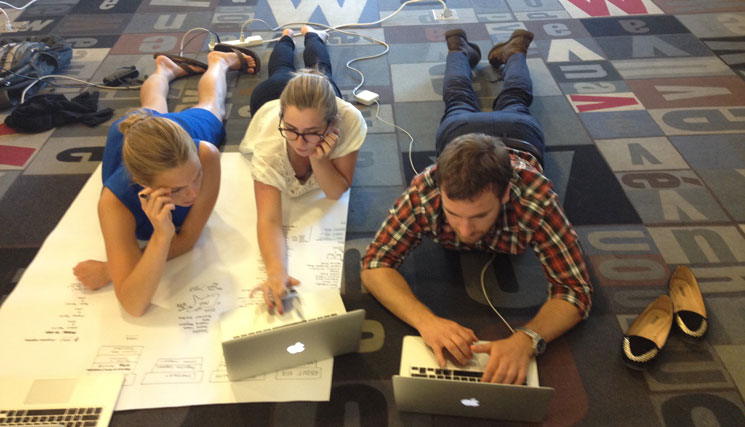In a society of narrowed attention span, multitasking is the name of the game. Burdened by existing clichés in the form of a work-life balance, or lack of it thereof, we routinely underestimate how the constant change is affecting us. And albeit this grows habitually on society, it affects sanity and messes up with the individual.

Work, deadlines, projects, job descriptions getting ticker and ticker, and an ever growing array of tiny little responsibilities we add up to our daily rotation. Naïve as it is, no doubt, it comes to hit us in a staccato sequence. For we mistake social with staring into a screen, having fun with whatever new, trendy, yet distorted version is currently up for sale. In effect, our imagery adds importance to the abstract, over time weakening our sense of what is truly valuable.
In lack of more sophisticated words, it seems as though we are all fighting to be important for the sake of being important; look busy for the sake of looking busy; and work for the sake of work alone. A matrix where all has to be moving for the sake of moving is what it is. Predictably, life stops being fun.
The anatomy of a burnout
Before addressing an elephant in the room, I must say that I’m typing this partially for myself. It’s been two years now how I took upon this internet projects thing, and opportunities have been piling up ever since. Success, at least in the loose sense of the word, started manifesting up as well.
But whenever automation and multitasking take the wheel, as happens increasingly, manic-like symptoms start to pop up. For opportunities, as the number tends to grow, bring along a plethora of responsibilities, deadlines, work load, anything but narrowed focus. The higher it goes, the slippery it becomes.
This article is about experiencing and (hopefully) preventing burnout, so this is just letting you know where things go down the line.
A burnout, unlike other conditions that happen ad hoc, comes from the front and you are in fact able to spot it. This makes no difference whatsoever, since you have this frightening lack of anxiety in relation towards it. A burnout, unlike a nervous breakdown, doesn’t command the same amount of fear and dread.
In a culture where multitasking is a virtue far more exalted than say introspective examination, we even romantically adopt the idea of a burnout. If I didn’t know better, I’d say it’s something that one is to brag about. A badge of honor, if you so prefer.
Having to draw a skinny on what it feels like, it is more of a rainy foggy autumn lasting for six months, than say, a massive thunder storm that is gone and done by the morning.
Burnout doesn’t just occur. Rather, you become its prisoner.
Learn to recognize the details prior
I’ve come to believe that the more subjective of an experience I have to share, the better it makes the read. Some would rush to call this narcissistic, and thought I don’t necessarily disagree, it is how we connect and share experiences.
I for one, love reading about other people stories especially before shit hits the fan back at my place. Awareness and perception can go a long way, especially with problems that don’t lend themselves to bargain solutions.
I never anticipated a burnout. But that’s always the bummer. Unless you are paying eye to detail, things can flip on their back the moment you think you are doing your best job.
And calling it details, in the full symbiotic sense of the word, is being blind and deaf to what’s really happening. In affluence of symptoms, we are blinded by whatever mix of ambition, routine, OCD-like work habits that we develop.
A burnout starts with an interesting relation between similarity and diversity. Let me explain myself. If you are doing some work or projects that are of similar nature, it makes room for things to go down the hill.
How come?
When the only diversity you are exposed to consists of job responsibilities as unrelated as responding to mail and writing the copy of a sales page, everything starts to look alike.
If by the off chance you are also expected to be creative and come up with ideas related to your job, the virus spreads, and the line between work hours and the rest of your day starts to progressively blur. When this happens, a burnout comes not if, but when.
Compulsively checking stats, traffic numbers, sales, bank accounts… I see now, thinking in straight lines, it was just the frosting on the cake. The same goes for thinking about work in bed, under the shower, even when out on a date with a girl.
The more you struggle, the more you burn out

The stupid thing one usually does when awareness of a possible burnout rushes in, is trying to artificially create balance. And I’m no exception to this.
When one project was nervously stomping my nerves, I would open up another, and another, and another. You never saw a man taking more pride in multitasking and refusing to quit. There wasn’t snowballs’ chance in hell for me to cave in.
I tried to diversify the projects, accepting, for the fun of it I guess, to work in a different niche with every next one.
So far, four of them fill my rotation, whereas one is a largest-to-be directory of services back where I live; another is a tourism site for the same place that is under construction (this might turn out pretty big); the third is a fitness product that is also in production; and finally this site that landed me many gigs and is making some decent money by itself.
An interesting thing happens when you ship enough work and learn from trial and error. It is probably common to the human experience, but there is this prejudice surrounding every project that you take, in a way that you feel your work more important, more complex, just more, than what other people do with their time.
An interesting antithesis to being afraid of society enjoying a collective laugh on your expense, thinking that your project is going to make millions is just as dangerous.
What helps in such circumstance, is the privilege to stay low. No one has to know about your project, so there is no additional burden to carry, no image to uphold. Deferring the need to come out of the closet and shout out laud about your work, at least to me, doesn’t look all that romantic.
I tend to avoid the spotlight, and I plan on doing so for as long as I can. But anonymity is a luxury one cannot afford when dealing with product creation and trying to satisfy customers. For some of the projects that are now under construction would surely benefit from a face behind them.
The fitness thing for one would require my presence in a series of videos. It also require a lot of workout on daily basis, and a diet plan and schedule so rigid, that writing about it makes me anxious.
To top all that, some problems with international money transfer have risen, and the volatile nature of internet business messes up with sanity in ways hard to describe.
Artificial balance, at least for me, came in the cloak of one relationship, and another, and another. People does solve a big part of the work-life balancing, so why not lighten the burden and date your way out of a burnout. That’s what I though too, but alas, no relationship, romantic or otherwise, is going to solve things. It has to be introspective.
Having a burnout – the diagnose
Working for work’s sake usually raises some red flags. It is, so to speak, a dominant symptom.
What also occurs is romanticizing over the idea of a big break. But not in the form of vacation, but rather a new, larger-than-life project, that by generating success is going to make all the noise stop. After I finish this one, that’s when I take a break. A huge fallacy, parroted around by every self-proclaimed workaholic.
Hitting the lows is another symptom. When functioning within a broad society becomes a form of work, something doesn’t smell right. Trying to ‘fit in’ usually goes hand in hand with extremes, coming from 80 hour weeks to whatever form of fun including either alcohol and late night partying, to binge watching series on Netflix in what turns out an escapism ordeal.
Some of this I experienced, some is only what I access from thinking about it all.
The best diagnose of a burnout, thus far, I experienced after teaming up with more people in order to cover more projects. This is so mostly as a way to feed up my enthusiasm and keep myself from burning out. Paradoxically, it adds some quality oil to the fire.
Believing you are a workaholic, you get to meet some very ambitious people. But the more you get to know them, the more you realize that they either behave the same as you, or as a matter of fact far worse.
What this does, in effect, is creating a perfect reflection of yourself. As good of a diagnose as you might hope for. It helps put things into perspective.
But what does it do to the feeling of self? The perceived importance of self that you were nurturing for so long, how other people fit into the puzzle, how you feel like everybody around you is wasting most of their time by doing non-important work or absorbing formal education etc…
Seeing people who are, sort to speak messed up, allows you to acknowledge how messed up you are. Seeing someone experiencing a burnout only highlights the symptoms of yours. So like I said, though typing this partially for myself, I hold my hopes that it will, in some way, benefit you as well.
Preventing burnout
Acknowledging there are two sides to life is what makes it interesting.
There are no two sides only, but rather three, five, fifteen, a boatload. While fun comes in many forms and shapes, it’s usually people that highlight a huge difference. So if the one aspect is work, work, work, the other has to be social, relationships. Well, not quite.
You see, the way I experienced it, for all the importance people play in our lives, they cannot do as good of a job as yourself when it comes to touching beneath the surface. Only you can restore balance – Introspectively, and then by changing how you conduct your daily routine, your life, in turn.
The morning ritual

I call it a ritual, but it doesn’t have to be one. It might, by extension to your lifestyle and values, be a rather habitual experience. All the role models of choice I tailor my life according to, they all have some sort of a habit as for how they start each day. Repeated just enough, it becomes a part of your identity.
And there is a noticeable difference between calm, hustle-free mornings, where you focus on yourself for a while, as opposed to a mess of email, news, junk food and whatnot.
Romantic as it sounds, the lifestyle of a tech entrepreneur, living off on Red Bull and pizza, and some pills that enhance cognitive ability, is not sustainable by any measure. We are not to judge about how some people conduct their lives, but on this one, I take a firm stance.
My ritual, as of some time ago, consists of yoga (more like holding stretch positions), eating a healthy breakfast, sitting in the quiet for a time while going over my plans and expectations for the day.
There is one very cool thing that I picked up from a guy named Tim Ferriss, and it highlights my morning routine in terms of preserving sanity for the rest of the day.
And it’s simple. Think for a while, without trying to limit yourself, about one meaningful thing that you can do later on in the day, and be perfectly satisfied with only that; so much so that you can call it a day. A productivity improvement technique deep at its core, this one simple trick will help you preserve sanity and gain perception.
The informational diet
In an environment where you nurture a perceived over-importance of self, it is dangerous not to consume anything, and only be producing. This is a sure recipe for limited perception, if ever there was any.
Instead, try to limit yourself to things that matter to your line of work or, as contrast, help you shape or maintain your values and principles. As for the mix to be complete, throw in some form of entertainment, be that in books, movies, music etc.
Forget about productive tomfoolery, there isn’t any. Learn to absorb information that doesn’t necessarily move you forward on the ladder of the success-money equation. Learn for the sake of learning. Have fun with it, be curious.
Limit your information intake so that you consume for one or half an hour, and then try to categorize that into what is applicable and how. This I recommend for work and self-improvement information only. Anything else that you consume, limit yourself to one hour or so per day, and enjoy it guilt free.
Forget about guilt
I wish I have mentioned guilt in a way to provide context. But it’s not that way at all. Guilt, you see, is essential to every burnout. The busier you convince yourself you are, the guiltier you feel over not being efficient enough, effective enough.
The worst part was the guilt. I felt enormously guilty every second I wasn’t doing something that could advance my career or earn money. I would pace around like a neurotic rat, coming up with random chores to distract myself. When the chores were finished, I’d think, “Okay… Now what?” Any activity that didn’t feel productive – sleeping in, watching TV, taking a trip – filled me with regret. There was this gnawing sense that I was wasting time. I was losing money. And yet, I had no desire to work. ~ An excerpt from the Four Hour Workweek.
Remember that guilt comes out of sensing that burnout is approaching. The deeper you enter this process, the guiltier you feel. It is a downward spiral with no end in sight. Forget guilt and have some fun.
Having fun will prevent the burnout
Irrespective of the way you define fun, it works and works wonders. For the compulsive mind is aching to brake free, and this is best achieved by savoring the moment.
I prescribe crazy amount of daily fitness workouts for myself, as it keeps me at bay. Though the thing is to add something new to the rotation once in a while and keep things fairly diverse. You can try the 21 Day Fix workout, or read more about it in this review of 21 Day Fix.
Something trendy, or something quaintly archaic, whatever it is try to keep yourself distracted from work.
Schedule the time if you have to, hold yourself accountable by inviting other people over, or take up membership in some club, or a school, or whatever.
Rock solid sleep
Same time, every day, seven to eight hours. No philosophy around it. In this grand sense, try to approach rest with some grain of common sense. That means, at bare minimum, to get ready for sleep by cutting off the ties with whatever stress you have during the day, an hour or so before you even enter the bedroom.
Might be hard to conceive at the beginning, but getting used to it is what it is. Set an alarm going off each day precisely at the same time, and start getting ready for bed.
Conclusion
This article has dragged on for more than it should have in the first place, so let me draw a conclusion by being plain obvious. A burnout, like blood pressure, is not a disease, but a symptom. And symptoms, the way I learned, are a sign that something else is broken. Your lifestyle, no doubt, is what needs closer examining.
The steps above, at least in some respect, are few of the ways to channel your energy throughout the day, while preserving both passions for life, as well as sanity. Just as thinking in straight lines and rules might spark creativity (counter-intuitive, I know), so can putting a frame on an otherwise loosen focus, and in turn messy lifestyle, create balance and fulfillment.